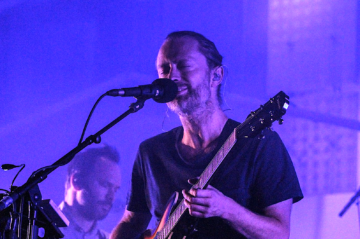

Like many bands with a killer, career-launching debut single, Radiohead has had a long, love-hate relationship with 1992’s “Creep”. There’s no way they would have become stadium fillers without it, but they’re also understandably sick of it. According to setlist.fm, they played it over 310 times between 1992 and 1998, and then they kind of dropped it from their gigs once they entered their Kid A phase. Only in 2016, during the Moon Shaped Pool tours did they add it back into the set.
But man, 2016 seems like a lonnnnnng time ago, doesn’t it? Everybody’s still figuring out the future of live concerts. Nobody is sure how far ahead is safe enough to announce ticket sales. Will venues be open or shut again? Into the fray of uncertainty comes this oddity: a nine-plus minute version of “Creep” credited to Thom Yorke. (“Thom Yorke should collab with Radiohead more often” says one wag in the YouTube comments). You want Creep, ya say? Well, here’s a LOT of it.
Thom Yorke takes his vocals, stretches them out until they’re corrupted digitally, and fills the airy gaps with acoustic guitar, adding twice as many bars as the original. As NPR said, Yorke’s vocals sound like a “rant from a man who’s lost his mind to old age and isolation.” (Hence the “Very 2021 Remix” title). It was about 30 years ago, we have to add, though we hate to admit it. Electronic burbles and bass throbs enter halfway through and further disturb the already disturbing.
Yorke created the mix for fashion designer Jun Takahashi, whose animated artwork runs in a loop for the video. The song accompanies Takahashi’s UNDERWORLD Fall 2021 collection runway show.
As Pitchfork points out, Yorke has contributed music to fashion shows before:
n 2016, he contributed an original song called “Coloured Candy” to Rag & Bone’s 2017 Spring/Summer showcase. Years prior, he contributed the songs “Stuck Together” and “Twist” for another one of the fashion label’s shows.
Yorke, by the way, hasn’t been laying low during the plague year. In May of this year he debuted a new side band called The Smile at Glastonbury, called out the Johnson government as “spineless” regarding their response to COVID and the live music scene, and shared a 30-minute mix of new music on BBC Radio 6. What comes next? Stay tuned.
Related Content:
Radiohead’s Thom Yorke Performs Songs from His New Soundtrack for the Horror Film, Suspiria
Radiohead Ballets: Watch Ballets Choreographed Creatively to the Music of Radiohead
Thom Yorke’s Isolated Vocal Track on Radiohead’s 1992 Classic, ‘Creep’
Ted Mills is a freelance writer on the arts who currently hosts the Notes from the Shed podcast and is the producer of KCRW’s Curious Coast. You can also follow him on Twitter at @tedmills, and/or watch his films here.
Radiohead’s Thom Yorke Releases a Super Creepy Version of “Creep” is a post from: Open Culture. Follow us on Facebook and Twitter, or get our Daily Email. And don't miss our big collections of Free Online Courses, Free Online Movies, Free eBooks, Free Audio Books, Free Foreign Language Lessons, and MOOCs.
from Open Culture https://ift.tt/3xAlZ5c
via Ilumina


Comments
Post a Comment